Table of Contents Show
I. Introduction
The concept of artificial intelligence dates back to ancient civilizations, but the modern history of AI started in the mid-20th century. Key milestones in AI development include the creation of the Turing Test in 1950, the introduction of the term “artificial intelligence” by John McCarthy in 1956, and the development of Machine Learning in the 1980s. AI has since evolved rapidly, with advancements in natural language processing, computer vision, and deep learning fueling the current AI boom. But What is the Future of AI in the coming decades?
A. Importance of understanding the future of AI
As AI becomes increasingly integrated into various aspects of our lives, it is crucial to understand its potential trajectory. By exploring the future of AI, we can anticipate changes and challenges, guiding its development in ways that are beneficial to society. This understanding also helps us prepare for the implications of AI on the workforce, privacy, ethics, and various other aspects of human life.
B. Overview of article content
The future of AI looks promising as technology keeps improving. In 2021, AI investments reached $93.5 billion, as reported by Statista. Bigger neural networks are expected in the near future as the need for more features increases. This article aims to provide a comprehensive exploration of the future of AI across several domains, including everyday life, workforce, ethics and regulations, scientific research, education, and entertainment. We will also discuss the opportunities and challenges that lie ahead as we continue to develop and implement AI technology.
II. What is the Future of AI in Everyday Life?
A. AI-powered virtual assistants and smart homes
Virtual assistants like Siri, Alexa, and Google Assistant have become integral to many people’s lives, and their capabilities continue to expand. The future of AI in this domain includes more sophisticated virtual assistants that can understand and respond to complex queries, emotions, and context. Furthermore, AI-powered smart homes will automate mundane tasks and learn and adapt to the occupants’ preferences, ensuring energy efficiency and comfort.
B. AI in transportation and self-driving cars
AI has made significant strides in the transportation sector, particularly in the development of self-driving cars. Companies like Tesla, Waymo, and Cruise are at the forefront of this revolution. The future of AI in transportation includes fully autonomous vehicles that can navigate complex urban environments, reducing accidents and traffic congestion. Additionally, AI-powered transportation systems will optimize public transit schedules and routes and aid in the development of smarter, more efficient cities.
C. AI in healthcare and personalized medicine
AI’s potential to revolutionize healthcare is immense. The future of AI in healthcare includes predictive analytics for early detection and prevention of diseases, AI-driven drug discovery, and personalized medicine based on an individual’s genetic makeup. Furthermore, AI-powered telemedicine and remote patient monitoring will make healthcare more accessible and affordable, particularly in underserved areas. Neuralink is one of the best examples.
III. What is the Future of AI in the Workforce?
A. AI and automation in various industries
As AI technology continues to advance, we can expect to see increased automation across numerous industries. Manufacturing, logistics, retail, agriculture, and customer service are just a few examples where AI can streamline processes and improve efficiency. AI-powered robots will perform repetitive, hazardous tasks or require extreme precision, allowing human workers to focus on more creative and complex tasks.
B. AI’s role in decision-making and problem-solving
AI’s ability to process vast amounts of data and identify patterns makes it invaluable for decision-making and problem-solving. In the future, AI will assist professionals across diverse fields such as finance, law, and medicine in making more informed decisions based on real-time data analysis. Moreover, AI systems will help organizations optimize resource allocation, develop innovative products and services, and tackle complex challenges that would be difficult or time-consuming for humans alone.
C. The impact of AI on employment and job displacement
While AI can potentially increase productivity and generate new job opportunities, it also raises concerns about job displacement. We have seen an increase in sustainability jobs due to AI. Automation may lead to the loss of jobs, particularly in roles that involve routine tasks. Investing in education and re-skilling programs is essential to ensure workers can adapt to the changing job market. In the future, we may see a shift towards jobs that require uniquely human skills such as empathy, creativity, and critical thinking.
IV. What is the Future of AI in Ethics and Regulations?
A. The need for transparency and accountability in AI systems
As AI systems become more integrated into our lives, ensuring transparency and accountability is crucial. In the future, AI developers must prioritize creating explainable systems that can be audited to mitigate risks and unintended consequences. This will also help build public trust in AI technology, fostering its responsible and ethical use.
B. Privacy and data protection concerns
AI systems often rely on large datasets to function effectively, which raises privacy and data protection concerns. In the future, AI developers must adhere to strong data protection standards to prevent unauthorized access, misuse, or manipulation of personal information. New techniques such as federated learning and differential privacy can also help protect sensitive data while enabling AI systems to learn and improve.
C. Establishing global AI ethics and governance frameworks
Rapid AI technology development and deployment call for global ethics and governance frameworks to ensure responsible use. In the future, international collaboration among governments, industry leaders, and academia will be essential to develop guidelines, standards, and regulations that promote AI’s ethical development and application. These frameworks must address issues such as fairness, transparency, accountability, and the equitable distribution of AI’s benefits and risks.
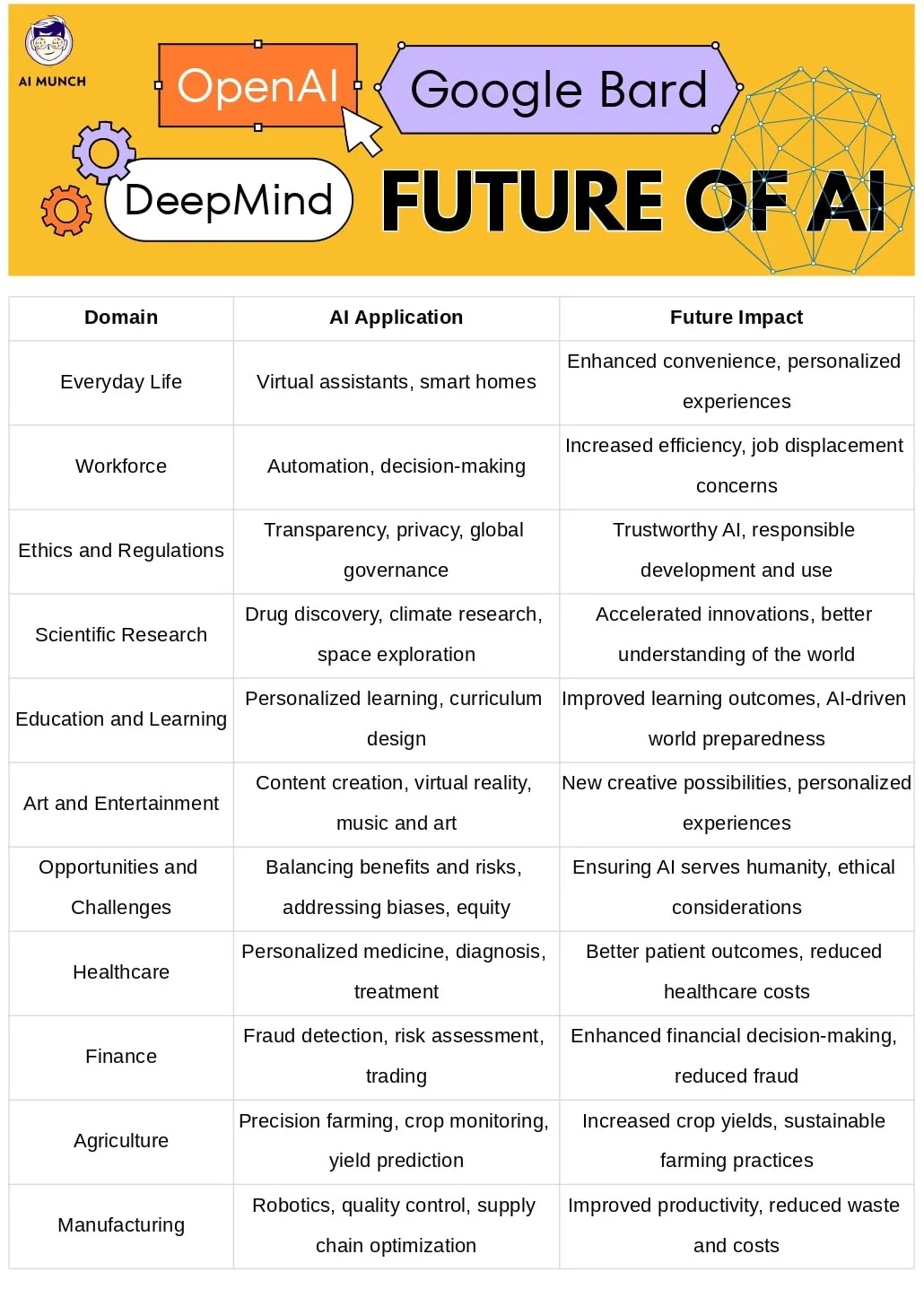
V. What is the Future of AI in Scientific Research and Innovation?
A. AI in drug discovery and disease prediction
AI can potentially revolutionize the pharmaceutical industry by accelerating drug discovery and development processes. In the future, AI algorithms will analyze vast amounts of data to identify potential drug targets, predict drug interactions, and optimize clinical trials. AI-driven predictive models will also improve disease diagnosis and prognosis, enabling more personalized and effective treatment plans for patients.
B. AI in climate change research and environmental monitoring
AI can play a critical role in combating climate change by analyzing complex environmental data and providing insights for informed decision-making. The future of AI in this domain includes more accurate climate models, which can inform climate mitigation and adaptation policies. Additionally, AI-powered environmental monitoring systems will enable real-time tracking of pollution, deforestation, and biodiversity loss, assisting in preserving and managing natural resources.
C. AI in space exploration and astronomy
AI is set to play a significant role in space exploration and astronomy. In the future, AI-powered telescopes and sensors will help scientists analyze massive amounts of data, accelerating the discovery of new celestial objects and phenomena. AI-driven autonomous spacecraft and rovers will explore distant planets and moons, gathering valuable information and conducting experiments with minimal human intervention. These advancements will deepen our understanding of the universe and expand the boundaries of human knowledge.
VI. What is the Future of AI in Education and Learning?
A. AI-driven personalized learning systems
The future of AI in education involves the development of personalized learning systems that adapt to each student’s unique needs, learning style, and pace. These AI-powered platforms will analyze student performance and provide tailored feedback, helping learners to overcome challenges and maximize their potential. This individualized approach can lead to improved learning outcomes and increased student engagement.
B. AI in curriculum design and content creation
There are many AI-based projects students can choose from. AI can also contribute to the development of innovative and effective educational content. In the future, AI algorithms will help educators design relevant curricula, engaging and aligned with learning objectives. Moreover, AI-powered tools will assist in creating interactive and immersive learning experiences, such as virtual reality simulations, gamified lessons, and adaptive assessments.
C. Preparing the next generation for an AI-driven world
As AI becomes increasingly prevalent in various aspects of life, it is essential to equip the next generation with the skills and knowledge needed to thrive in an AI-driven world. This includes fostering digital literacy, critical thinking, and adaptability and teaching students about AI ethics and responsible technology use. Integrating AI education into the curriculum can empower young people to harness AI’s potential for society’s betterment.
VII. What is the Future of AI in Art and Entertainment?
A. AI in content creation and storytelling
AI has the potential to revolutionize content creation and storytelling by generating novel ideas, plots, and characters. In the future, AI-powered tools will assist writers, filmmakers, and other creatives in producing engaging and immersive stories. These systems will also enable the personalization of content, allowing audiences to enjoy tailored experiences based on their preferences and interests.
B. AI-powered virtual reality and gaming experiences
Web 3.0 is taking over the world very fast. The future of AI in gaming and virtual reality involves creating more realistic, dynamic, and immersive experiences. AI-driven characters and environments will adapt and respond intelligently to user actions, providing unique and engaging gameplay. Additionally, AI can generate personalized content and challenges, ensuring that players remain motivated and entertained. Moreover, Metaverse is here as well.
C. AI in the world of music and art
AI is increasingly being used to create original music and art, raising intriguing questions about creativity and authorship. In the future, AI algorithms will collaborate with human artists, generating new ideas and styles that push the boundaries of artistic expression. AI can also help democratize the creative process, enabling more people to access and participate in artistic endeavours.
VIII. Opportunities and Challenges
A. Balancing the benefits and risks of AI technology
As AI technology continues to advance, it is crucial to balance its benefits with potential risks. This involves developing AI systems that are safe, reliable, and aligned with human values. It also requires ongoing collaboration among stakeholders, including governments, industry leaders, and researchers, to establish guidelines, policies, and best practices that promote AI’s responsible development and deployment.
B. Addressing potential biases and discrimination in AI
AI systems can inadvertently perpetuate biases and discrimination, particularly when trained on biased data. To ensure fairness and equity in the future of AI, developers must prioritize addressing these issues, using techniques such as fairness-aware machine learning and algorithmic auditing. Fostering diversity and inclusion within the AI community can also help generate a broader range of perspectives, contributing to more equitable AI systems.
C. Ensuring AI serves all of humanity, not just a select few
As AI technology becomes more widespread, it is vital to ensure its benefits are accessible to all, rather than concentrated among a select few. This involves investing in AI research and infrastructure that promotes social good, addresses digital divides, and empowers marginalized communities to participate in and benefit from AI-driven innovations.
IX. Conclusion
AI has the potential to reshape our world in profound and far-reaching ways, impacting nearly every aspect of our lives. By understanding and anticipating the future of AI, we can ensure that these technologies are developed and used responsibly, maximizing their potential to improve the human condition.
A. Emphasizing the importance of responsible AI development and use
As we continue to explore the future of AI, it is essential to prioritize responsible development and use. This includes addressing ethical, social, and governance concerns and fostering transparency, accountability, and public trust in AI systems.
B. The ongoing journey to answer the question, “What is the future of AI?”
The future of AI remains a complex and evolving landscape, with many unanswered questions and uncertainties. By engaging in thoughtful dialogue, research, and collaboration, we can continue to navigate this uncharted territory and shape a future where AI serves the greater good of humanity.
FAQs
By 2050, AI is expected to change the world, as Stakhov cautions significantly. He mentions a possible dark AI future where a few people controlling AI gain immense power, leaving 99% of the population powerless. These AI rulers would control the world’s data, turning everyone else into their subjects.
Opinions differ among experts about when and how human-level AI might be created. However, 90% of them think it’s possible that this major change in human history, known as the AI transformation, could happen within the next century.
By 2030, AI will play a crucial role in daily business tasks, helping people with creative work, generating new ideas, and tackling previously unsolvable problems. In some situations, working together with AI will be necessary.
Is AI a promising career choice? The AI field offers excellent career prospects. The Bureau of Labor Statistics forecasts a 31.4% growth in jobs for data scientists and mathematical science experts, who are essential for AI, by 2030.
The impact of AI on environmental jobs cannot be ignored. It is projected that East Asia would be the region that could witness the most job gains from using AI for environmental applications, potentially increasing its workforce by 2.5 percent by 2030, in comparison to a baseline scenario.
Jobs in sustainability will be affected by AI. AI can help companies identify, understand, and mitigate these inequalities, and improve the way companies report and manage labor issues, contributing to a more equitable and sustainable working environment.
Although AI can take over certain tasks, it cannot replace human problem-solving abilities. So, to achieve exceptional outcomes in scientific endeavours, it’s essential to combine the strengths of AI with human curiosity.
Do you want to read more? Check out these articles.
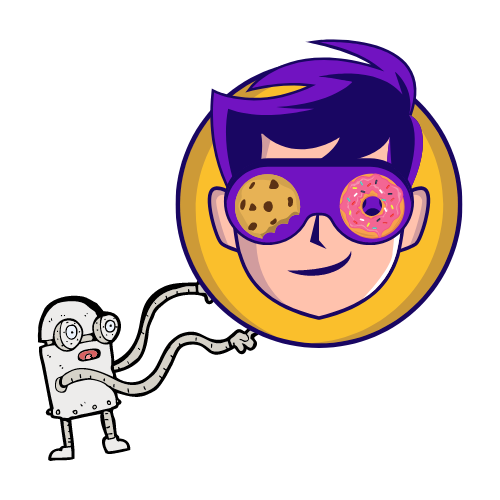


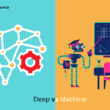
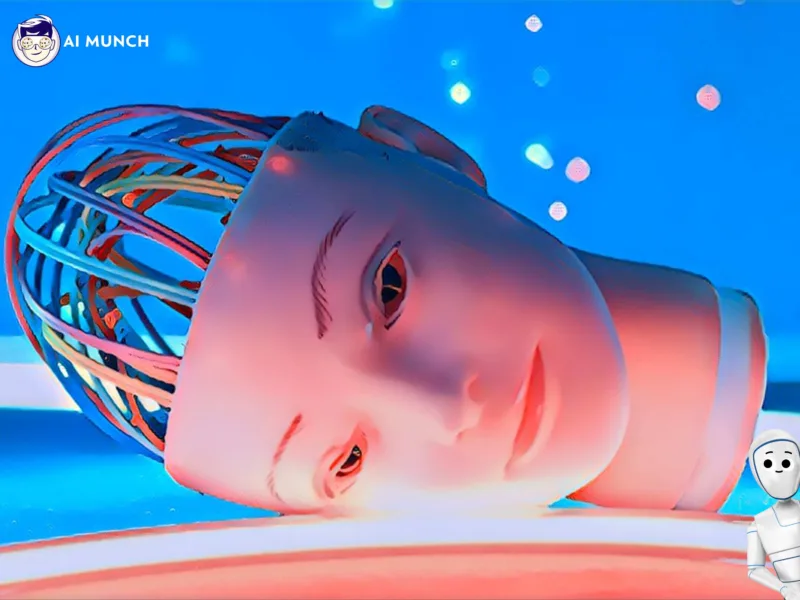

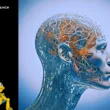
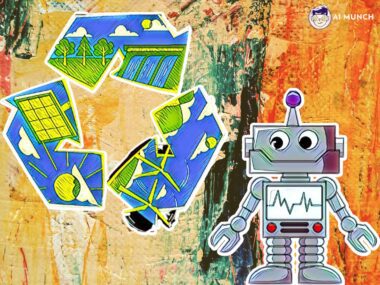
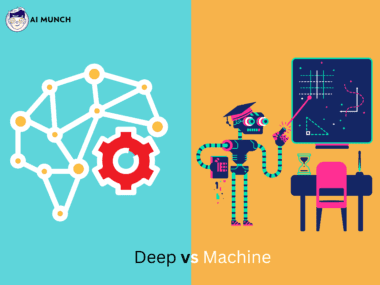
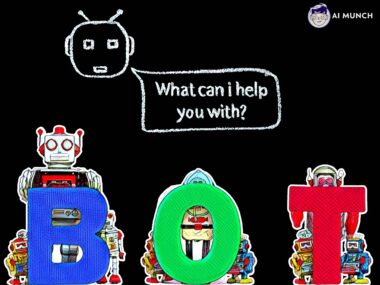

1 comment